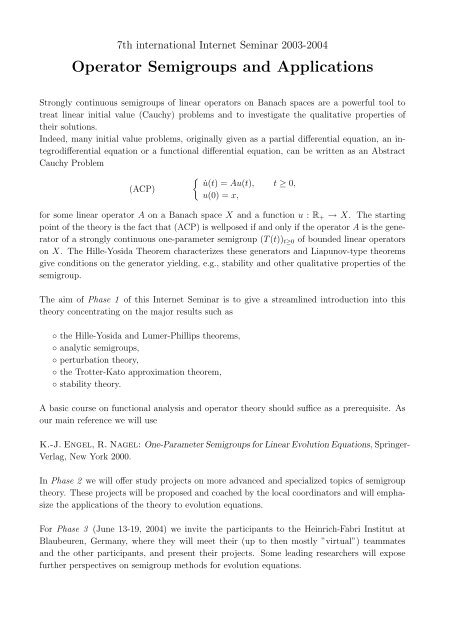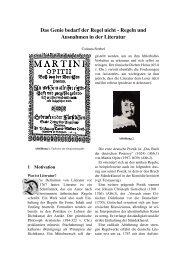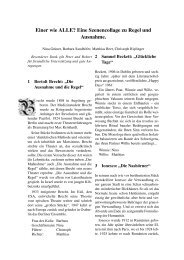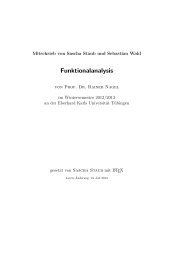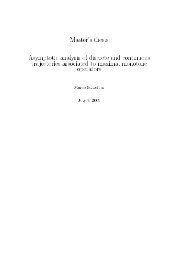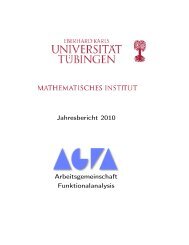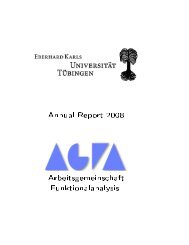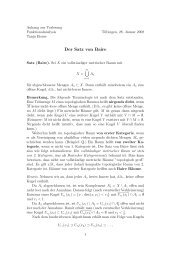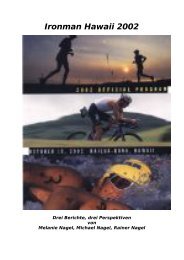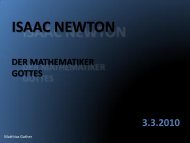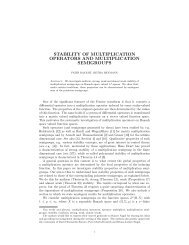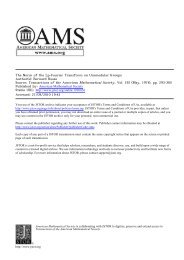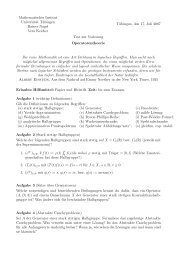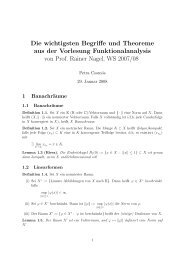Operator Semigroups and Applications
Operator Semigroups and Applications
Operator Semigroups and Applications
You also want an ePaper? Increase the reach of your titles
YUMPU automatically turns print PDFs into web optimized ePapers that Google loves.
7th international Internet Seminar 2003-2004<br />
<strong>Operator</strong> <strong>Semigroups</strong> <strong>and</strong> <strong>Applications</strong><br />
Strongly continuous semigroups of linear operators on Banach spaces are a powerful tool to<br />
treat linear initial value (Cauchy) problems <strong>and</strong> to investigate the qualitative properties of<br />
their solutions.<br />
Indeed, many initial value problems, originally given as a partial differential equation, an integrodifferential<br />
equation or a functional differential equation, can be written as an Abstract<br />
Cauchy Problem<br />
(ACP)<br />
{ ˙u(t) = Au(t), t ≥ 0,<br />
u(0) = x,<br />
for some linear operator A on a Banach space X <strong>and</strong> a function u : R + → X. The starting<br />
point of the theory is the fact that (ACP) is wellposed if <strong>and</strong> only if the operator A is the generator<br />
of a strongly continuous one-parameter semigroup (T (t)) t≥0 of bounded linear operators<br />
on X. The Hille-Yosida Theorem characterizes these generators <strong>and</strong> Liapunov-type theorems<br />
give conditions on the generator yielding, e.g., stability <strong>and</strong> other qualitative properties of the<br />
semigroup.<br />
The aim of Phase 1 of this Internet Seminar is to give a streamlined introduction into this<br />
theory concentrating on the major results such as<br />
◦ the Hille-Yosida <strong>and</strong> Lumer-Phillips theorems,<br />
◦ analytic semigroups,<br />
◦ perturbation theory,<br />
◦ the Trotter-Kato approximation theorem,<br />
◦ stability theory.<br />
A basic course on functional analysis <strong>and</strong> operator theory should suffice as a prerequisite. As<br />
our main reference we will use<br />
K.-J. Engel, R. Nagel: One-Parameter <strong>Semigroups</strong> for Linear Evolution Equations, Springer-<br />
Verlag, New York 2000.<br />
In Phase 2 we will offer study projects on more advanced <strong>and</strong> specialized topics of semigroup<br />
theory. These projects will be proposed <strong>and</strong> coached by the local coordinators <strong>and</strong> will emphasize<br />
the applications of the theory to evolution equations.<br />
For Phase 3 (June 13-19, 2004) we invite the participants to the Heinrich-Fabri Institut at<br />
Blaubeuren, Germany, where they will meet their (up to then mostly ”virtual”) teammates<br />
<strong>and</strong> the other participants, <strong>and</strong> present their projects. Some leading researchers will expose<br />
further perspectives on semigroup methods for evolution equations.
Structure of the Internet Seminar<br />
Phase 1: October–February<br />
The organizers will assist the participants to become acquainted with the BSCW program. A<br />
detailed manual for BSCW will be provided. We will then send study material (as dvi-, ps- or<br />
pdf-files) on a weekly basis to the participants <strong>and</strong> local coordinators. This material includes the<br />
basic text, additional exercises, bibliographic references <strong>and</strong> open problems. The participating<br />
students, supervised by their local coordinators, will study <strong>and</strong> discuss this material. Each<br />
participant is strongly encouraged to communicate via BSCW with the other participants on<br />
questions, solutions, <strong>and</strong> new problems.<br />
Phase 2: February–June<br />
The local coordinators will propose study projects to the students. Guided by the coordinators,<br />
the teams prepare seminar talks <strong>and</strong> inform the other participants about their work via written<br />
status reports.<br />
Phase 3: June<br />
This is when the ’virtual’ seminar becomes ’real’ <strong>and</strong> all participants are invited to a joint<br />
workshop. The students meet their teammates, present their seminar talks, <strong>and</strong> attend survey<br />
talks on recent research by some of the coordinators. The workshop takes place June 13-19,<br />
2004 at the Heinrich-Fabri-Institut Blaubeuren, Germany. The living expenses are covered by<br />
the organizer; travel expenses are the responsibility of each individual participant.<br />
Potential Participants<br />
The Internet Seminar is aimed at graduate <strong>and</strong> Ph.D. students. The participants are expected<br />
to have some basic knowledge from functional analysis <strong>and</strong> operator theory. They should have<br />
a local coordinator responsible for scientific, technical, <strong>and</strong> bureaucratic matters. The Internet<br />
Seminar uses the BSCW (‘Basic Support for Cooperative Work’) software to facilitate the<br />
electronic communication between participants. To use this tool, the student needs access to<br />
a recent version of an internet browser. Mathematical texts should be edited in Tex or in Latex.<br />
Each local coordinator should<br />
Local Coordinators<br />
◦ provide access to the internet to his students<br />
◦ help his students with mathematical <strong>and</strong> technical problems<br />
◦ ensure that his students receive full credit for the seminar.<br />
Scientific Committee<br />
Wolfgang Arendt (Ulm)<br />
András Bátkai (Budapest)<br />
Klaus-J. Engel (L’Aquila)<br />
Aless<strong>and</strong>ra Lunardi (Parma)<br />
Giorgio Metafune (Lecce)<br />
Rainer Nagel (Tübingen)<br />
Abdelaziz Rh<strong>and</strong>i (Marrakesh)<br />
Lutz Weis (Karlsruhe)<br />
http://www.fa.uni-tuebingen.de/tulka/isem


